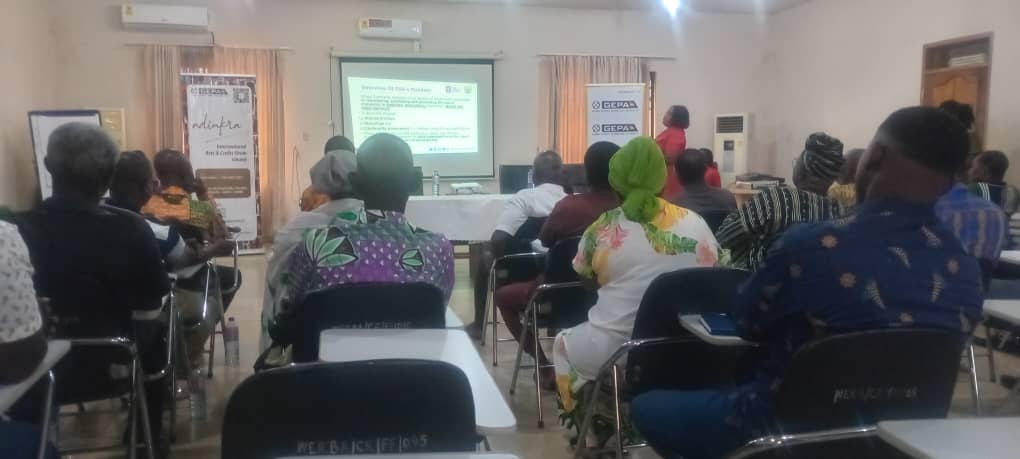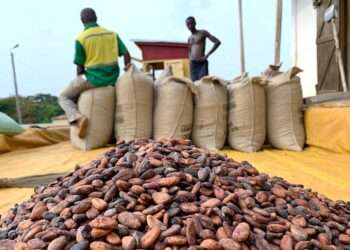In a renewed drive to promote Ghana’s non-traditional export sector, the Ghana Export Promotion Authority (GEPA) has trained 30 artisanal palm oil producers from Agona Nkwanta and nearby communities on best practices for producing palm oil that meets international standards.
The intensive training aimed at equipping producers with knowledge on food safety, regulatory compliance, quality control, and access to finance—key elements needed to position their products for the global market.
The initiative, held in the Western Region, is part of a broader regional strategy under the National Export Development Strategy (NEDS) to enhance the quality and marketability of palm oil in four key districts: Tarkwa, Prestea Huni Valley, Wassa East, and Ahanta West.
Speaking at the event, Madam Ursula Tawiah, Deputy Director at GEPA’s Western Regional office, emphasized the importance of capacity building in the artisanal sector. “Supporting producers across the value chain with the requisite knowledge is critical in advancing Ghana’s non-traditional exports,” she stated. She noted that oil palm, along with coconut, has been prioritized in the region under the NEDS program.
According to Madam Tawiah, the national target is to increase the value of non-traditional exports from the current $3.8 billion to $25.3 billion by 2029. However, persistent challenges such as the illegal addition of Sudan IV dye, outdated processing methods, poor access to high-quality seedlings, and limited knowledge of export standards continue to hamper progress.
“In Ahanta West, we currently produce about 20,000 metric tons of palm oil annually. With improved practices, we can increase production by 40% in the next five years.”
Wassa East currently produces about 15,000 metric tons annually but has vast underutilized land with potential to reach 25,000 metric tons. Prestea Huni Valley follows closely with 18,000 metric tons produced predominantly by small-scale producers. In Tarkwa Nsuaem, more than 138,000 oil palm seedlings have been distributed since 2019 under government and private sector programs.
Integrating Small Producers into Export Schemes
The training also aligned with the Accelerated Growth for Export Development (EDAG) program, which complements NEDS in fostering export-readiness. Madam Tawiah noted that integrating small-scale producers into structured export frameworks is key to building sustainable agricultural value chains.
“Our goal at GEPA is not just to boost export volumes but to also improve the livelihoods of local producers through sustainable practices,” she added. The program encouraged participants to adopt better production techniques, adhere to safety and regulatory protocols, and take full advantage of the training opportunities available to them.
Regulatory Bodies Emphasize Compliance and Standards
Mr. Benjamin Dadson, Principal Regulatory Officer at the Food and Drugs Authority (FDA), stressed the importance of regulatory compliance in ensuring sustainability and quality assurance. “Quality assurance is critical in your line of work. We keep seeing the same regulatory violations. If these persist, closures may become necessary,” he warned.
Mr. Dadson advised the palm oil producers to build proper processing, storage, and distribution spaces—even with local materials—and to avoid exposing raw materials to contamination. He further urged them to form cooperatives to better access government interventions and institutional support.
Madam Rebecca Williams, Principal Administrative Officer of the Ghana Standards Authority, reaffirmed the Authority’s impartial role in ensuring product quality. She encouraged producers to adopt Good Manufacturing Practices (GMP) and to engage with the Authority for product certification and licensing to facilitate access to international markets.
As Ghana pushes to expand its non-traditional exports, initiatives like this represent a crucial step toward inclusive growth, rural empowerment, and a diversified national export base.
READ ALSO: Investor Pulse Wavers as GSE Indices Pare and Trading Activity Plummets























